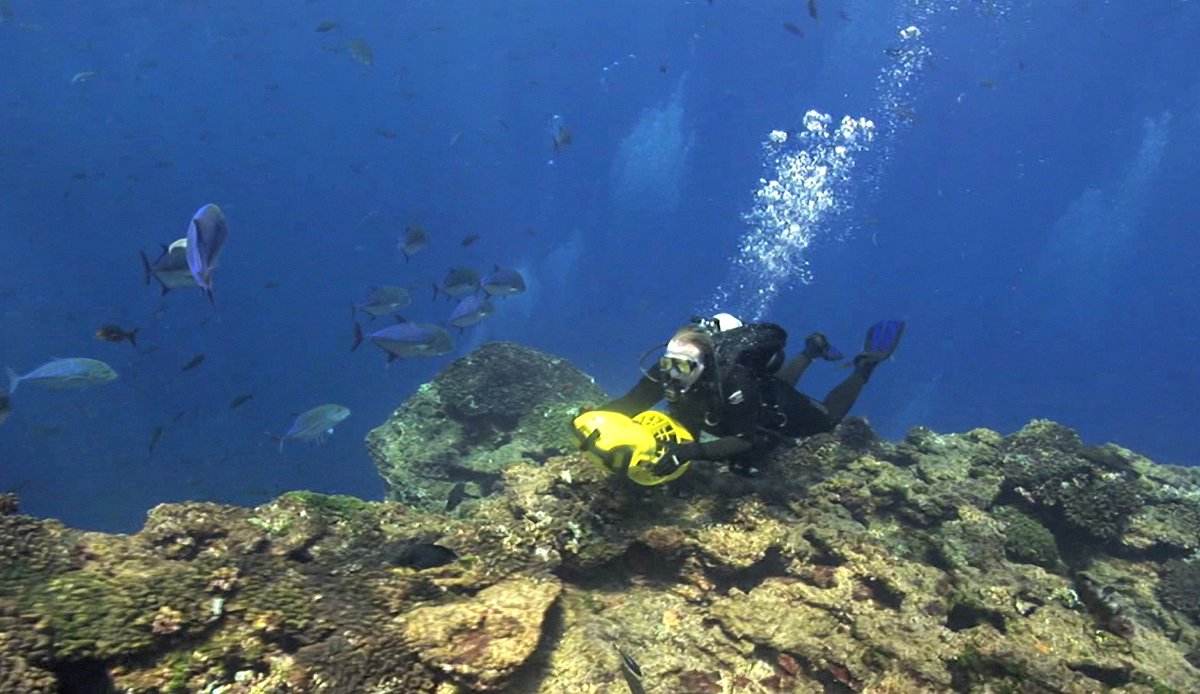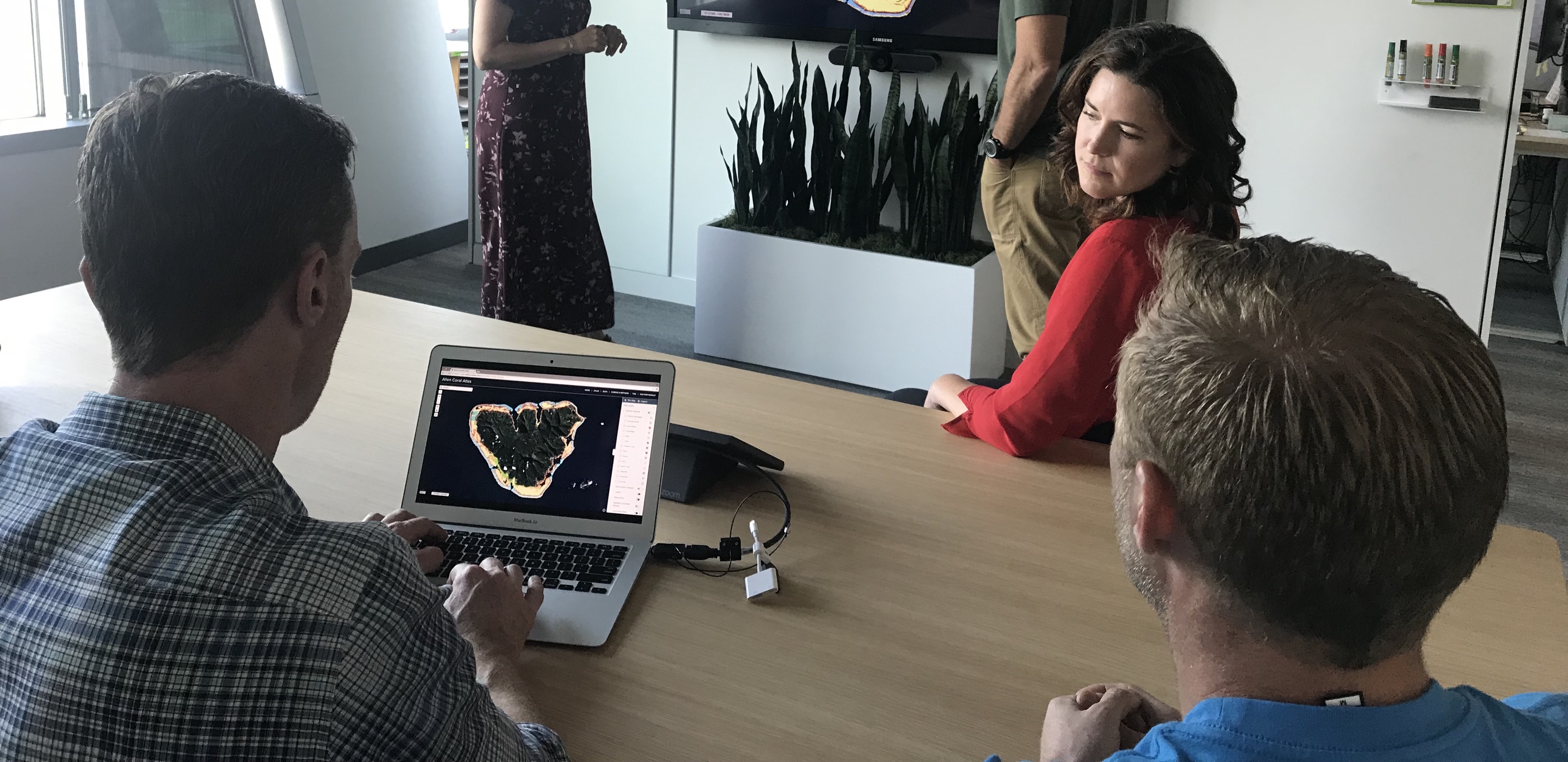Meet the team: Vulcan
August 6, 2019Vulcan Inc. provides stewardship and technical infrastructure for the Allen Coral Atlas. Get to know the team and their work.
Paul Allen, founder of Vulcan and co-founder of Microsoft, challenged us with a bold and audacious goal — save coral reefs around the world. The Allen Coral Atlas is the first step toward fulfilling that mission.
The Vulcan team leads development of strategy and impact goals, project and data management, and user engagement. Based in Seattle, WA, the team includes coral reef experts, subject matter experts, project managers, and developers who create the Allen Coral Atlas to navigate the coral crisis.

Paul Allen, founder of Vulcan, scuba diving.
Lauren Kickham leads the team, Charlie Whiton is the Director of Product Management for the team, and Kirk Larsen leads the technical team. James Deutsch, Janet Greenlee, Sarah Fries-Torres, Paulina Gerstner, Kyle Rice, Stephanie Caruso, Tommy Greene, Kevin Brockway, Matt Skone, Sailaja Yelamanchili, Eldan Goldenberg, and Andy Jacobs also work on the project.
We work with ASU's Center for Global Discovery and Conservation Science; Planet; National Geographic Society; and University of Queensland's Remote Sensing Research Center. The Vulcan team collaborates with all of these partners, and focuses on developing the website (right here!) as a usable tool to understand coral reef data.
The Atlas lives among a network of of environmental protection efforts and projects launched by Vulcan. Developing new platforms and data sets is a key way that Vulcan seeks to make an impact on global challenges in ocean health, bioscience, wildlife conservation, and more.
What are you reading right now?
Charlie: I do listen to How I Built This and Planet Money podcasts. The HIBT episode about Shopify founder, Tobias Lütke, is a mind-blowing startup story.
Paulina: Hot, Flat, and Crowded by Thomas L. Friedman.
Kyle: Coral Reefs and Climate Change, which comes highly recommended by Chris on the UQ team.
James: Yuval Harare’s books, Sapiens, Homo Deus, and 21 Questions for the 21st Century. Harare really makes you think about humankind’s values and impact on the world, what the future may hold, and what we want it to look like.

Charlie Whiton, Lauren Kickham, and Kyle Rice looking at a map of Mo'orea on the Allen Coral Atlas.
What's a map that changed your life?
Charlie: I was pretty shocked the first time I saw a map of the bottom of the ocean. Of course it is just land mass with water over it, but to think of vast valleys and seamounts is amazing!
Eldan: This map of the indigenous languages, language groups and nations of the US. Even though I now understand this map to have plenty of flaws of its own (reflecting biases from 50 years ago), it was one of the first things to make me realise how very simplified an idea I had of indigenous cultures. The fullness of the map, the number of different nations and linguistic families, and the ways the "culture areas" boundaries don't match up to any current political divisions all tell such a rich story.
Kyle: Popularity heat maps! As a cyclist, the collective information for route planning brings mapping to a new level of interactivity.
James: When I was studying cichlid fishes in Lake Malawi for my postdoc, I spent several days in and out of the maps department of the Government of Malawi trying to get hold of, and eventually succeeding, colonial 1:50,000 charts of Lake Malawi and its coastline. The effort was worth it—armed with simple maps we could understand how the habitat patches in the Lake corresponded with different species and subspecies of fishes and test hypotheses for how this family of fishes in this place has blossomed to create more species than anywhere else on Earth. By coincidence, one of my partners in this work was a young Madeleine VanOppen, now a Paul G. Allen Family Foundation grantee and leader in the field of helping corals to evolve to warming waters.

Chris Roelfsema, who works on the Allen Coral Atlas with the UQ team, and Charlie Whiton meet to discuss the Atlas in Australia.
What are you up to when not working on the Allen Coral Atlas?
Charlie: Mountain biking, crossfitting and skiing — most of which with my two kiddos Wyatt and Madeline.
James: Today, I’m in South Luangwa National Park meeting with the Government Parks Department and a local NGO Conservation South Luangwa to plan management of the park over the next three years including work to reduce the conflict between local farmers and elephants who eat their crops.
Where are you originally from? Tell us about it!
Charlie: I'm from Wyoming originally, more cows than people!
Paulina: I’m from Needham, Massachusetts, home to the oldest high school rivalry in the country! Needham versus nearby town Wellesley High School.
James: New York City. Many people may not realize that New York was critical in the birth of the global conservation movement, led by Teddy Roosevelt and the founders of the Wildlife Conservation Society. Roosevelt’s realization that America’s resources were finite and needed to be stewarded has lessens for all of us as humankind exceeds the Earth’s ability to provide for us or absorb our impact.
The Vulcan team, including the Allen Coral Atlas partner leads, at a recent event hosted by Vulcan in Seattle, WA.
What's some work you really admire right now?
Charlie: The Peloton story [of at-home, on-demand fitness] is a miracle business-building story — inspiring and daunting at the same time. So many obstacles and yet it created an entirely new sector in its category.
Eldan: This report the Arizona Republic just published about wildfire risks around the Western US. I appreciate two things about it in particular: how it combines the likelihood of fires with all the human and built environment factors that change the risk to people, and how they then explain the very complex model they've built in a clear and engaging way.
James: I admire the work by Harvard's David Keith on solar geo-engineering. As much as I would like to believe that we will pull together as a species and reduce carbon emissions in time to stave off catastrophic climate change of more than 2º C, and as much as we need to focus primarily on that effort, in my heart I honestly have to admit that I expect we will fail. If and when we do fail, we will need to fall back on more radical solutions, combined with reduced emissions and carbon sequestration. One of those may be preventing solar radiation from reaching the Earth. It’s scary, and dangerous, and a long-shot, but it could eventually save us and the other species with whom we share the Earth from complete catastrophe.
Learn about Vulcan and the history of the Atlas
The Allen Coral Atlas is the first high resolution global map of the world’s coral reefs. The Atlas is built and maintained through a partnership between the University of Queensland, Planet, Arizona State University’s Center for Global Discovery and Conservation Science (GDCS), National Geographic Society, and Vulcan Inc.

